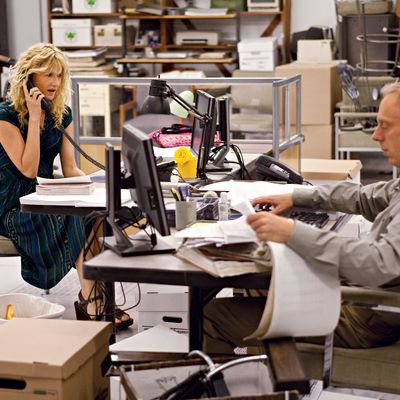
What if you had the key that could unlock the chains, the magic key that could free us all—would you use it?” asks Amy Jellicoe (Laura Dern), the heroine of HBO’s great comedy Enlightened, which returns for its second season this week. Amy thinks she has such a key—a password to access e-mails of the executives at her L.A.-area cosmetics company, Abaddonn, who she suspects are lying greed-balls who pollute the environment, sell unsafe products, and plot to replace their workforce with “one fat guy in an office somewhere.” And she’s right.
Too bad this righteous messenger is so easy to shoot. Amy is a former sales executive who last season took a leave for reckless behavior, rehabbed at a holistic treatment facility, and rejoined the company as a wage slave in Abaddonn’s experimental Cogentiva division, ground zero of the worker-replacement scheme. She’s a paranoid, manipulative flirt, a lazy flake whose workload is carried by her nebbishy co-worker Tyler (series co-creator Mike White), and a drama queen who acts as if other people are supporting players in the Julia Roberts movie of her life. “This is fate, serious fate, like sword-in-the-rock fate,” Amy tells her mother, played by Dern’s real-life mom, Diane Ladd. “Maybe I am chosen for something, you know?”
Contemporary TV is suddenly filled with shows starring charismatic yet ostentatiously flawed heroines: Homeland, The Mindy Project, Girls, Don’t Trust the B—- in Apartment 23. Enlightened stands out because its vision is so much wider. It’s not just about Amy and her co-workers, or the question of which of them, if any, are “sympathetic.” It’s about how hard it is to change anything in this country, even small stuff, and how people will do or say anything to keep from rocking the boat. No one on Enlightened is easy to like—except maybe Tyler, a sad sack with a crush on Amy—but they’re equally hard to hate. White (who writes most of the episodes) treats every character as a human being worthy of empathy, even when they’re selling one another out to preserve their personal status quo. “Maybe I’m a mole,” Tyler tells Amy, “but I’m a happy mole.”
At the end of last season, Abaddonn executives invited Amy to present her evidence at a board meeting, then mocked her afterward as a nutcase Pollyanna; she overheard them and became so enraged that she fantasized about burning the place to the ground. This season, she attempts to lure a hunky journalist (Dermot Mulroney) into writing a muckraking piece. He says the company’s behavior is “unethical, it’s immoral, I know that, but it’s not illegal.” He won’t write about Abaddonn because its heinousness is sadly typical. That’s more chilling than Walter White’s mustache-twirling antics on Breaking Bad.
Remarkably, Enlightened doesn’t adopt a morally superior tone to any of this. Things are never either-or. They’re always both-and. Amy is a deeply damaged and irritating woman. Her grandiose voice-over reveries are filled with rehab platitudes and portentous images that suggest a Los Angeles tourism ad directed by Terrence Malick. She’s so narcissistic that when she grins at the targets of her goodness, she seems to be admiring her reflection in their pupils. But despite her borderline derangement, she’s right about Abaddonn and right to be mad that no one cares. “I’m just tired of feeling small,” Amy says. Isn’t everyone?
Enlightened. Sundays at 9:30. HBO.
*This article originally appeared in the January 14, 2013 issue of New York Magazine.


